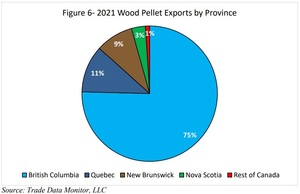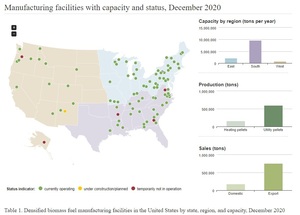Business Briefs
Energy Disrupter
- <img src="http://biomassmagazine.com/uploads/posts/magazine/2021/08/resize/CanadianExportPellets_16291240533711-300×300-noup.jpg" title="
SOURCE: TRADE DATA MONITOR, LLC</small>”> - <img src="http://biomassmagazine.com/uploads/posts/magazine/2021/08/resize/EIARenewables2020-PMM21_16291240534126-300×300-noup.jpg" title="
</small>”>
ADVERTISEMENT
Wood, waste energy account for 22% of US renewables
The U.S. consumed a record 12% of renewable energy in 2020, according to data released by the U.S. Energy Information Administration. Wood and waste energy accounted for approximately 22% of renewables.
According to the EIA, consumption of renewable energy in the U.S. grew for the fifth consecutive year in 2020, reaching a record high of 11.6 quadrillion British thermal units, or 12% of total U.S. energy consumption. Renewable energy was the only source that increased from 2019 through 2020; fossil fuel and nuclear consumption declined.
Wood and waste energy, including wood pellets and biomass waste from landfills, accounted for about 22% of U.S. renewable energy consumption last year.
Delta Biofuel proposes Louisiana bagasse pellet plant
Louisiana Gov. John Bel Edwards and Delta Biofuel CEO Philip Keating announced the company is evaluating Iberia Parish, Louisiana, for a planned $70 million bagasse-to-wood pellet plant. Delta reported it has secured long-term supplies of feedstock bagasse that will be sourced from four nearby sugar mills in Iberia, St. Mary and St. Martin parishes. The company also said it has engaged European and Asian energy production facilities for multiyear commitments to purchase the fuel pellets. Delta Biofuel plans to locate the greenfield facility on 16 acres near U.S. Highway 90 in Jeanerette, Louisiana, near one of its bagasse suppliers, Enterprise Sugar Mill. Groundwork for the new facility is planned for September, with completion expected in about a year.
Canadian wood pellet production to reach 3.8 million metric tons in 2021
Canadian wood pellet production is expected to grow to 3.8 million metric tons (MT) in 2021, according to a report filed with the USDA Foreign Agricultural Service’s Global Agricultural Information Network.
According to the report, growth in wood pellet production this year is expected to be achieved as plant capacity utilization improves. The report notes that production expansion continues to be primarily driven by growth in exports, particularly to the U.K. and Japan. Domestic use of wood pellets for heat and power generation, however, remains limited. Canadian wood pellet exports are forecast to reach 3.3 million MT this year, up from 2.901 million MT in 2020 and 2.637 million MT in 2019.
According to the report, Canada is expected to have 47 wood pellet plants in operation this year with a combined 5.054 million MT of production capacity, up from 46 plants with a combined 4.856 million MT of capacity as of 2020. Capacity use is forecast to reach 75.2 percent this year, up from 72.1 percent in 2020 and 69.1 percent in 2019.
Canadian wood pellet production is expected to grow by approximately 300,000 MT this year, reaching 3.8 million MT.
Pinnacle donates funds to Canadian wildfire relief
Pellet manufacturer Pinnacle, part of Drax Group, donated nearly $40,000 to Canada’s Red Cross to support relief efforts for small communities hit by recent wildfires in Canada’s western-most province of British Columbia.
The funds donated to the British Columbia Fires Appeal will be used for immediate and ongoing relief efforts, long-term recovery, resiliency and preparedness for future events in British Columbia and impacted regions, including consequential events related to the fires.
Pinnacle, which was acquired by Drax Group in April, is headquartered in Vancouver and has operations across B.C. and Alberta in Canada, and Alabama in the U.S. The acquisition increased Drax’s annual operational capacity from 1.6 million metric tons (MT) of wood pellets to 4.9 million MT by 2022, with 17 plants in locations across western Canada and the U.S. South.
















